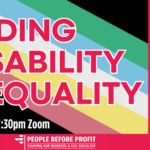In a statement, Richard Boyd Barrett TD, for People Before Profit and member of the Oireachtas Budgetary Oversight committee has said the “long fought for” Irish Film industry (Section 481) stakeholder Forum which takes tomorrow, 10am-4pm (February 8th ) in the Radisson Blu Hotel in Dublin (Golden Lane) “must finally address the issue of guaranteeing full employment rights for Film workers and ending the use of unfair buy-out contracts for actors and others in the industry”.
The establishment of the Forum was most recently recommended in the report produced by Oireachtas Budgetary Oversight Committee on the Section 481 Film Tax Credit in May 2023.
Deputy Boyd Barrett, who requested that the Budgetary Oversight Committee to undertake the report and who has campaigned for a number of years to address the concerns of Film Crew, Actors and other creative workers in the industry, will participate in tomorrow’s Forum being hosted by the Department of Tourism, Culture, Arts, Gaeltacht, Sport and Media.
After the years-long campaign for the forum to take place, Minister Catherine Martin finally agreed to convene the forum towards the end of last year and more recently announced that it would take place on February 8th.
Richard Boyd Barrett TD said:
“This Film Industry forum is a long-time coming. It should have happened long before now and now that it is happening it must ensure that all those who work in the industry, whether they are actors, writers, directors, or film crew are treated fairly.
The Section 481 Film Tax Credit is worth in the region of a €100 million a year of public money to assist the Irish Film Industry. However, this very welcome funding for Irish Film is legally conditional on the Film Producers who receive the money providing “quality training and employment” and on meeting what are known as the “Industry development test” and the “Culture Test.”
This means that recipients of this funding must comply with all employment legislation, guarantee workers and performer’s all their legal rights, and contribute to developing a genuine industry that contributes to Irish culture.
However, for years workers, actors and other creatives in the industry have complained that their rights were being breached by film producers, denying recognition of their service to the industry and other employment rights or by forcing actors and others to sign unfair buy-out contracts, which denied them the legal entitlement to royalties or down-stream revenues for their work.
All of us want to see the government support the development of a thriving film industry in this country. Indeed, I believe we need to increase funding to the Irish Film industry and to other areas of cultural and artistic endeavor. We have buckets of talent in Ireland, whether it is actors, performers, writers, and directors or skilled and committed film crew.
However, if we want this industry to reach its full potential, we must ensure that film crew have sustainable careers and some degree of employment security. We need to make sure that our actors, performers, writers, and directors receive fair and equitable remuneration for their work at least on a par with their counterparts in other countries. We must make absolutely sure that even the possibility of blacklisting is eliminated.
I am very glad this forum is finally taking place. It should not have taken years of campaigning to get this far but now that it is, the government must ensure that those who work in our film industry are treated fairly, have all their legal rights vindicated and that the legal conditions of public funding of the industry are met.”












